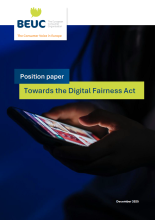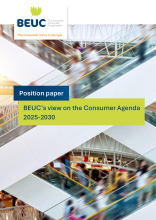
Latest News
Logo

Reports
Available in
English
Influencer marketing is everywhere and unavoidable for anyone on social media due to the high volume of content and boundless creativity of social media influencers. Between March and September 2025, 14 BEUC consumer organisations from 12 countries monitored about 650 posts and videos of social media influencers on TikTok, Instagram, YouTube and Snapchat.
Although influencer marketing is present in nearly all sectors, this evidence-gathering focused on posts and videos promoting unhealthy food advertising and fast fashion as they are sectors where consumers are likely to be particularly at risks. Evidence confirms the widespread use of hidden advertising practices and how influencers appeal to emotions to shape consumers’ preferences. It also shows how brands use influencer marketing to give a positive spin to their reputation in the eyes of consumers, in particular the youngest ones.
As we identified in 2023, current EU law is only partially able to tackle the problems posed by influencer marketing and needs to be updated.1 It must clarify the responsibilities of the different actors operating in the influencer marketing environment - from influencers and their agencies to brands and online platforms. This report provides additional evidence supporting ongoing policy discussions at EU and national level. This is particularly the case for the EU Digital Fairness Act and the evaluation of the Audiovisual Services Media Directive, both expected in 2026.
Although influencer marketing is present in nearly all sectors, this evidence-gathering focused on posts and videos promoting unhealthy food advertising and fast fashion as they are sectors where consumers are likely to be particularly at risks. Evidence confirms the widespread use of hidden advertising practices and how influencers appeal to emotions to shape consumers’ preferences. It also shows how brands use influencer marketing to give a positive spin to their reputation in the eyes of consumers, in particular the youngest ones.
As we identified in 2023, current EU law is only partially able to tackle the problems posed by influencer marketing and needs to be updated.1 It must clarify the responsibilities of the different actors operating in the influencer marketing environment - from influencers and their agencies to brands and online platforms. This report provides additional evidence supporting ongoing policy discussions at EU and national level. This is particularly the case for the EU Digital Fairness Act and the evaluation of the Audiovisual Services Media Directive, both expected in 2026.
Position paper
Available in
English
Currently, EU law insufficiently addresses unfair commercial practices in the digital realm. This means that policymakers should urgently update EU consumer law. BEUC believes the upcoming Digital Fairness Act is the key tool to make this change happen.
You will find all our recommendations for this important initiative in our new position paper.
You will find all our recommendations for this important initiative in our new position paper.
Tools
Available in
English
Consumers combining different transport modes do not currently benefit from harmonised rights at EU level, making them completely dependent on operators’ terms and conditions. The European Commission proposed creating a framework in 2023 and both the European Parliament (EP) and the EU Council have reached their positions. It is now essential that the final compromise delivers a high-level of consumer protection.
This two-pager sums up BEUC’s main recommendations for trilogue negotiations. For more information see our position paper.
This two-pager sums up BEUC’s main recommendations for trilogue negotiations. For more information see our position paper.
Tools
Available in
English
Passenger rights are essential consumer protections and are currently under review. In practice, few consumers get to exercise their rights due to overly lengthy, burdensome and ineffective enforcement procedures. This calls for change and trilogues need to clarify and strengthen passenger rights and their enforcement rather than diminish them. For more information, see our position paper, the Council and Parliament’s positions.
Press release
Available in
English
Today, the European Commission opened a rule-breaking procedure against the Spanish government for fining five airlines for their unfair hand-luggage pricing practices in May 2024. The overall fine amounted to €179 million. This decision takes place while Spanish courts are yet to give their decision on Ryanair's ongoing appeal of the fine.
Tools
Available in
English
European consumers often book their holidays through pre-arranged or customised packages, which are regulated
by the existing Package Travel Directive (PTD). With the ongoing revision, BEUC provides recommendations for trilogue negotiations.
by the existing Package Travel Directive (PTD). With the ongoing revision, BEUC provides recommendations for trilogue negotiations.
Position paper
Available in
English
In the last years, consumers came across many new challenges from the COVID pandemic, war in Ukraine to the persistent cost-of-living crisis. As a result, their purchasing power and market behaviours have changed significantly. Today, more than ever, they need strong consumer protection legislation and its effective roll out and enforcement to fully benefit from the Single Market. Those are the prerequisites for more consumer trust, without which an improved EU competitiveness cannot become a reality. The upcoming Consumer Agenda will set a vision for the EU consumer policy for the next five years and will directly impact any developments in this area that have a potential to deliver to consumers.
Press release
Available in
English
Two years after BEUC denounced airlines’ widespread greenwashing to EU authorities, the situation has improved but more still needs to be done. As the Paris Air show is in full swing, BEUC encourages the European Commission and the network of consumer protection authorities (CPC-Network) to keep investigating the airlines’ practices and agree on commitments to make their marketing more trustworthy.









